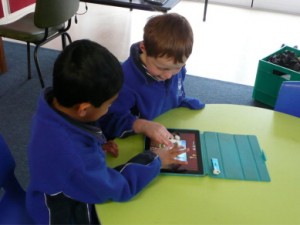
The researchers recorded the conversations of pairs of 5-year-olds using numeracy and literacy apps.
A new piece of research found that students using iPads in class spent the more than 90 percent of their time working on the learning tasks assigned by the teacher and not distracted.
The research, published in the August volume of Computers & Education, found that pairs of 5-year-olds spent only 7 percent of their time talking about things unrelated to the specific lesson they were doing with the device.
The research used an interesting approach where they installed an app on the device that recorded the discussion of the students using the device and then they examined the content of their conversations to understand not only what the students were doing but how they were working together.
Key Results
- Only 7% of the time was spent talking about non-class matters.
- Nearly 2/3rds of the time was spent on explaining the assignment or discussion.
- Only about 4% of the time was spent in “exploratory” talk that researchers feel lead to better learning outcomes.
Although the research highlighted the fact that students stayed on task when using the iPads, the researchers still saw room for more collaboration and more discussion among the young children.
“These results are very encouraging, and highlight the potential of collaborative learning environments supported by iPads to generate opportunities to raise the quality of student talk. However, the lack of exploratory talk suggested much of this potential was unrealized,” authors Garry Falloon and Elaine Khoo wrote. “The predominance of cumulative talk created something of an ‘echo chamber-of-affirmation’ effect, where students progressed tasks smoothly, generally through non-critical agreement with their partner, or by adopting work practices characterized by device ‘turn taking.’”
The survey was a relatively modest one, studying the conversations of 19 5-year-olds in New Zealand.
The authors also stressed that their review of the videos and audio of students using the devices confirmed that the actual design of the apps could have a strong effect on whether students discussed the assignment critically or just moved through the project.
“iPads and apps may constitute motivating and engaging skill-practice environments, but students still need a basic toolkit of strategies and capabilities to apply to them. Helping students build these skills is where the teacher’s pedagogical role is crucial,” the authors concluded.
